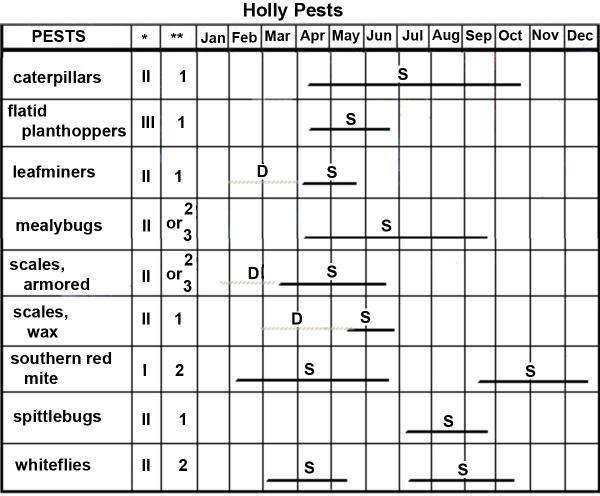Caution
This information was developed for North Carolina and may not apply to other areas.
Please click on the thumbnail to enlarge a concise version of the table.
Jump to the table legend.
See section 4 for an accessible version of the table in HTML format.
Legend
* Degree of importance of pest: I = Important pest, high probability of occurrence, II = Treat as needed: III = Occasional pest, treat when detected.
** Number of applications needed for most effective control. It is usually best to wait 10 to 14 days between applications in cool weather and 7 to 10 days between applications in warm weather.
S = Spray application; D = Drench.
Other Resources
- Armored Scale Identification and Management on Ornamental Plants. Frank, S. 2010. Entomology Insect Notes, NC State Extension Publications.
- Caterpillars That Feed on Trees and Shrubs. Frank, S. and S. Bambara. 2009. Entomology Insect Notes, NC State Extension Publications.
- Citrus Flatid Planthopper. Baker, J. 2013. PDIC Factsheets, NC State Extension Publications.
- Indian Wax Scale. Franks, S. and J. Baker. 2009. Entomology Insect Notes, NC State Extension Publications.
- Leafminers of Hollies. Baker, J. 2016. PDIC Factsheets, NC State Extension Publications.
- Managing the Twolined Spittlebug in the Home Landscape. Frank, S. et al. 2002. Entomology Insect Notes, NC State Extension Publications.
- Mealybugs. Franks, S. and J. Baker. 2010. Entomology Insect Notes, NC State Extension Publications.
- Mulberry Whitefly. Baker, J. 2017. PDIC Factsheets, NC State Extension Publications.
- Planthoppers. Frank, S. et al. 2000. Entomology Insect Notes. NC State Extension Publications.
- Southern Red Mite and Spruce Spider Mite. Frank, S. et al. 2011. Entomology Insect Notes, NC State Extension Publications.
- Insect and Related Pests of Shrubs. Baker, J. R. ed. 1980. NC Agricultural Extension Service publication AG-189. 199 pp.
- North Carolina Agricultural Chemicals Manual
- Extension Plant Pathology Publications and Factsheets
- Horticultural Science Publications
Find your local N.C. Cooperative Extension center.
This insect note has not been peer reviewed.
Section 4
| Pests | Degree of Importance of Pest | Number of Applications Needed for Most Effective Control* | Jan | Feb | Mar | Apr | May | June | July | Aug | Sep | Oct | Nov | Dec |
|---|---|---|---|---|---|---|---|---|---|---|---|---|---|---|
| caterpillars | Treat as needed | 1 | Spray application | Spray application | Spray application | Spray application | Spray application | Spray application | Spray application | |||||
| flatid planthoppers | Occasional pest, treat when detected | 1 | Spray application | Spray application | Spray application | |||||||||
| leafminers | Treat as needed | 1 | Drench | Drench | Spray application | Spray application | ||||||||
| mealybugs | Treat as needed | 2 or 3 | Spray application | Spray application | Spray application | Spray application | Spray application | Spray application | ||||||
| scales, armored | Treat as needed | 2 or 3 | Drench | Drench | Drench, Spray application | Spray application | Spray application | Spray application | ||||||
| scales, wax | Treat as needed | 1 | Drench | Drench | Drench, Spray application | Spray application | ||||||||
| southern red mite | Important pest, high probability of occurrence | 2 | Spray application | Spray application | Spray application | Spray application | Spray application | Spray application | Spray application | Spray application | Spray application | |||
| spittlebugs | Treat as needed | 1 | Spray application | Spray application | Spray application | |||||||||
| whiteflies | Treat as needed | 2 | Spray application | Spray application | Spray application | Spray application | Spray application | Spray application | Spray application |
*It is usually best to wait 10 to 14 days between applications in cool weather and 7 to 10 days between applications in warm weather. ↲
Publication date: Oct. 4, 2018
Reviewed/Revised: Sept. 24, 2019
N.C. Cooperative Extension prohibits discrimination and harassment regardless of age, color, disability, family and marital status, gender identity, national origin, political beliefs, race, religion, sex (including pregnancy), sexual orientation and veteran status.

